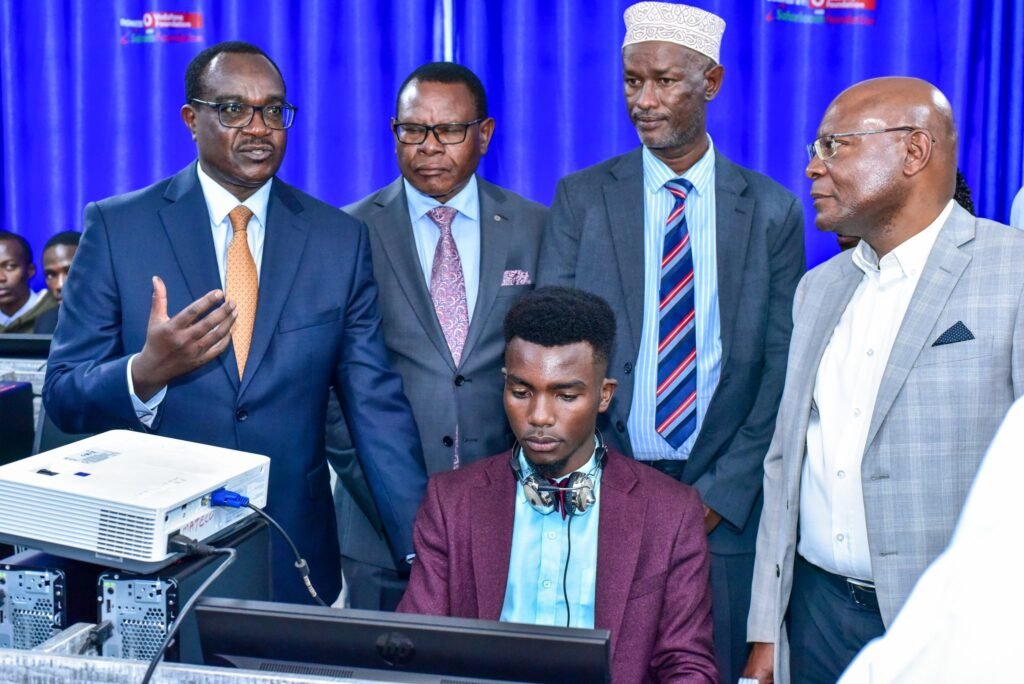Launching the Scaling Digital Skills Programme: A New Era for Teacher Training in Kenya

Current CS of Education. PHOTO/MOE

Introduction to the Scaling Digital Skills Programme
The Scaling Digital Skills Programme, recently launched by Education Cabinet Secretary Julius Migos Ogamba, represents a pivotal advancement in teacher training within Kenya. As the world transitions into an increasingly digital landscape, the need for educators to possess robust digital skills has never been more critical. This initiative aims to equip teachers with the necessary competencies to navigate and leverage digital technologies effectively, enhancing both teaching methodologies and student engagement.
At the heart of the programme lies the objective to incorporate digital skills into the education curriculum, thereby addressing the existing gaps in teacher training colleges. By integrating these skills, the programme seeks to foster a cohort of educators who are not only knowledgeable but also adaptive to the ever-evolving digital environment. The emphasis on digital literacy is particularly relevant today, as educational institutions strive to keep pace with technological advancements, ensuring that both teachers and students are prepared for future challenges.
The Scaling Digital Skills Programme also aims to set clear targeted outcomes for participating institutions, focusing on improving the overall quality of education in Kenya. Through structured training sessions, workshops, and resource sharing, the initiative is designed to uplift educational standards across the board. The programme recognizes that enhancing teacher capabilities is essential for cultivating a generation of learners equipped to thrive in a technology-driven society.
Furthermore, the significance of this initiative extends beyond mere skill acquisition. By promoting the integration of digital skills into teaching practices, the programme is set to revolutionize the educational landscape in Kenya, paving the way for innovative teaching strategies that can substantially enhance learning experiences. This transformation holds the potential not only to uplift individual educators but also to elevate the entire educational system, contributing positively to the nation’s development in the digital age.
The Role of Key Stakeholders
The successful launch of the Scaling Digital Skills Programme in Kenya hinges significantly on the active participation and collaboration of various stakeholders. Among these, the Safaricom Foundation plays a pivotal role, particularly through the dynamic leadership of its chairman, Joe Ogutu. Under his stewardship, the foundation has prioritized the integration of digital literacy into the educational framework, recognizing its essential contribution to modern teaching methodologies.
In addition to the Safaricom Foundation, the partnership between government entities and private sector organizations is crucial in establishing a supportive ecosystem for teacher training. The government is tasked with setting educational policies and ensuring that an infrastructural backbone exists for digital learning. This partnership amplifies the effectiveness of initiatives aimed at enhancing digital skills among educators, providing them with the essential tools and resources to facilitate learning in a technologically evolving environment.
The collaboration between these parties encompasses financial support, resource allocation, and the development of training modules that align with the curricular needs of Kenyan schools. Such synergy not only enriches the content delivered during training but also ensures that it is relevant and practical for real-life educational scenarios. Furthermore, it fosters an atmosphere of innovation, where stakeholder ideas can coalesce into actionable solutions that scale teacher training efforts across the country.
Moreover, the involvement of non-governmental organizations and educational institutions amplifies the capabilities of the Scaling Digital Skills Programme. These organizations often come equipped with expertise in training methodologies and curriculum development. Ultimately, the collective efforts of these stakeholders not only bolster teacher competency but also contribute significantly to elevating the overall quality of education in Kenya, thereby addressing the digital divide in the educational landscape.
Implementation Strategies for the Programme
The successful implementation of the Scaling Digital Skills Programme in teacher training colleges within Kenya necessitates a multifaceted approach. One of the fundamental strategies includes comprehensive curriculum development that integrates digital skills into existing training structures. This curriculum will be designed in collaboration with educational experts and stakeholders, ensuring that it meets the dynamic needs of the teaching profession.
Furthermore, the training of trainers will be a central focus. Educators will undergo specialized professional development programs aimed at enhancing their digital pedagogical skills. This preparatory phase is vital, as it equips instructors with the necessary tools and confidence to facilitate learning in a digital environment. The programme will leverage blended training methodologies, enabling educators to engage with both theoretical frameworks and practical applications of digital technologies.
Resource allocation is another critical aspect of the implementation strategy. Financial resources will be directed towards acquiring necessary technological tools, such as laptops and projectors, and developing digital content that supports the new curriculum. Additionally, infrastructure improvements will be made to ensure that schools have reliable internet access, which is imperative for effective digital skill training.
Technology integration in classrooms will involve not only the provision of equipment but also the establishment of software platforms that facilitate learning management and collaboration among students. These platforms will foster an interactive environment where learners can access digital resources and engage in virtual classrooms, enhancing their learning experience.
However, the implementation of the Scaling Digital Skills Programme is not without challenges. Potential obstacles may include resistance to change among educators, uneven access to technology across the regions, and a lack of sufficient training support for all personnel involved. To address these challenges, the programme will incorporate continuous feedback mechanisms, ensuring that adjustments and improvements can be made swiftly to enhance the adoption of digital skills training.
Future Implications of Digital Skills in Education
The integration of digital skills into teacher training has far-reaching implications for the educational landscape in Kenya. As technology becomes increasingly embedded in everyday life, the need for educators to develop proficiency in digital tools and resources is critical. Teachers equipped with digital skills can enhance their teaching methodologies, leading to improved student engagement and learning outcomes. This shift promotes a more dynamic and interactive learning environment, where educators can leverage technology to cater to diverse learning styles and needs. For instance, the use of interactive multimedia can make complex concepts more accessible and foster a conducive atmosphere for collaboration among students.
Moreover, integrating digital competencies not only benefits current teaching practices but also prepares educators for future challenges in the evolving educational landscape. As remote learning and digital platforms become mainstream, teachers who are digitally literate will be better positioned to adapt to new pedagogical approaches and technologies. This adaptability is crucial in a world that increasingly relies on virtual communication and information sharing.
Furthermore, the Scaling Digital Skills Programme aligns with global education trends that prioritize 21st-century skills such as critical thinking, creativity, and problem-solving. Kenya’s commitment to advancing education in the digital age reflects an understanding of the necessity to equip the next generation with relevant skills for the workforce. By embracing digital skills training, the programme contributes to the overall enhancement of educational quality and ensures that Kenyan students are not left behind in the global arena. This initiative not only redefines teaching and learning dynamics but also positions Kenya as a forward-looking nation dedicated to educational excellence and innovation.




